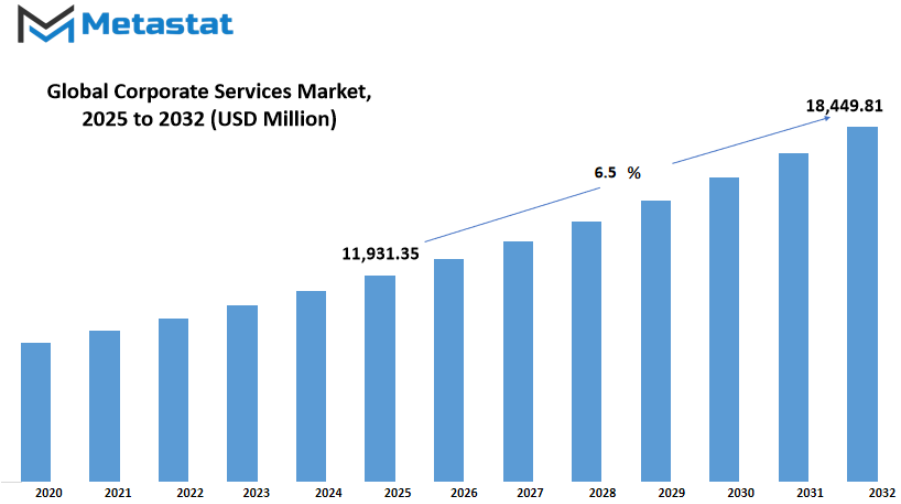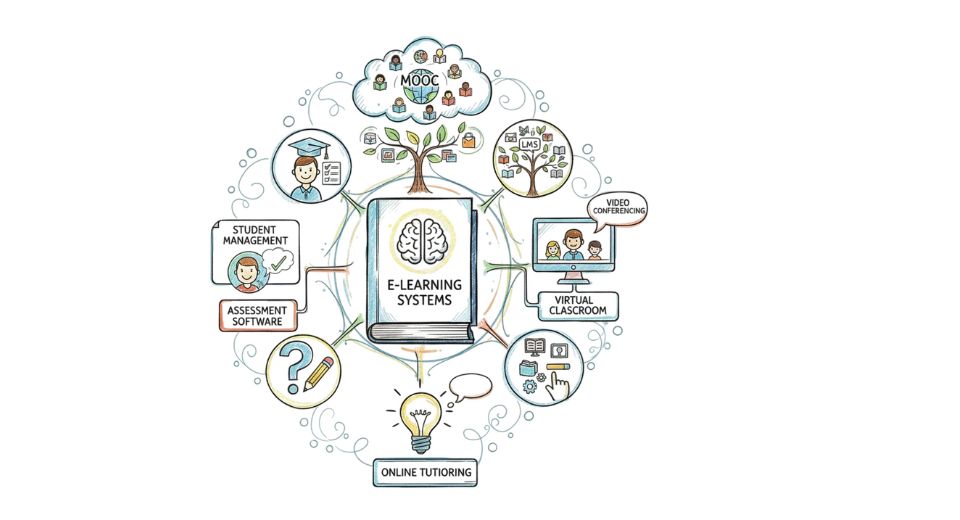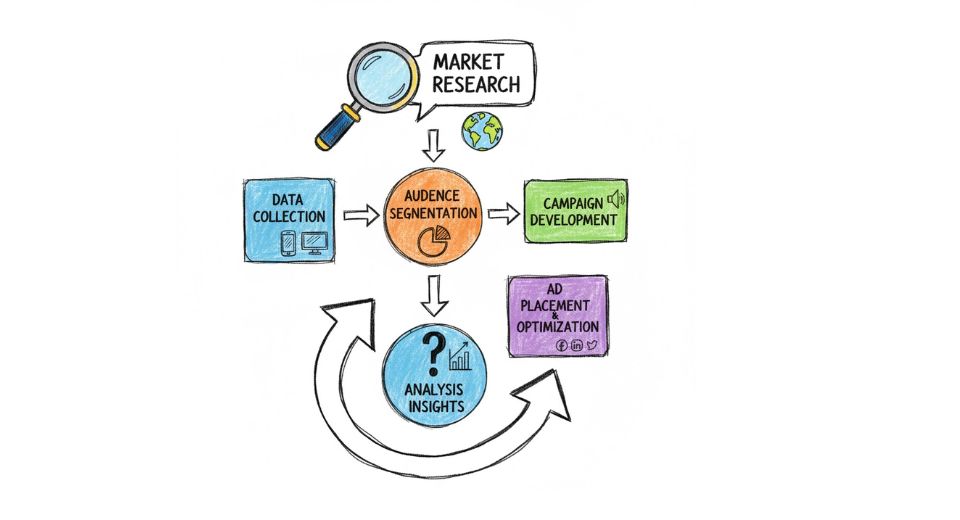MARKET OVERVIEW
The global corporate services market is one component of the broader business support industry, constructed around the operational requirements of businesses that operate across various geographies and regulatory regimes. It has grown from a group of back-office activities into an organized industry that will define how multinational businesses deal with finance, compliance, administration, and shared resources in the next few years. The nature of this market is not in short-term fixes but in creating architectures that enable businesses to remain nimble while negotiating intricate internal and external requirements. This market at its foundation will be about the capability to integrate services that have historically worked in silos.
Firms will increasingly need to have centralized systems that manage accounting, payroll, taxation, procurement, legal, and governance. Historically, these were dispersed across functions and frequently outsourced in piece-meal fashion. The global corporate services market will build integrated products with uniformity, precision, and streamlining as prime concerns. This will not only eliminate duplication but also ensure a more transparent information flow within organizations. Another crucial aspect of this market will be alignment with regulatory requirements. Governments and local authorities will continue to revise regulations on corporate tax, reporting, and compliance, and companies will require partners that can help them interpret and execute these changes across various jurisdictions.
This trend will promote the service providers' role from being execution-oriented to becoming strategic partners for corporations. The global market will thus not only coordinate tasks but will ensure that organizations are legally and ethically compliant in all countries they are present in. Technology will certainly impact this sector, but its aim will be more towards facilitating accuracy rather than substituting human know-how. Automation will rationalize activities with a high data load, like payroll and record keeping, but interpretation, advisory, and delicate decision-making will still require skilled professionals. The equilibrium between human judgment and computerized tools will determine the integrity of service providers in this segment.
In the next decade, enterprises will seek service platforms where the best systems are integrated with knowledgeable professionals who can customize solutions instead of providing generic outputs. Organizational and cultural diversity will also influence the future of global corporate services. International corporations tend to have employees distributed around the globe, with each having its own practices, languages, and business customs. Service providers will have to maintain these differences while still imposing uniformity in management and reporting. The ability to live with different corporate cultures without compromising high standards of service will become a quality indicator in this market. As the competitive environment matures, the global corporate services market will stand as a critical intermediary between corporate aspiration and operational reality. Its worth will not be calculated in the mere cost savings but in freeing companies to concentrate on their core agendas while experienced partners manage compliance, governance, and administration. Through this means, the industry will shift away from being an unseen behind-the-scenes function and will take a core role in organizational resilience and long-term strategy.
Global corporate services market is estimated to reach $18,449.81 Million by 2032; growing at a CAGR of 6.5% from 2025 to 2032.

GROWTH FACTORS
The global corporate services market will keep growing as businesses in various industries seek more efficiency and tighter compliance structures. Organizations are subject to increasing regulatory pressures in various geographies, and it becomes challenging for them to function without expert guidance that guarantees complete compliance with the laws of the land and international regulations. This rising complexity in regulation has placed a great demand for service providers that specialize in risk management, audit compliance, and governance advisory. With tightening laws and greater supervision, professional advice will become indispensable to prevent financial sanctions and maintain organizational reputation. In addition to the compliance aspect, the imperatives of operational effectiveness and cost saving will be a key driver for the global market.
Companies are on the lookout for solutions to simplify processes, eliminate wasteful spending, and enhance productivity without reducing quality. Outsourcing non-core activities, embracing technology-based solutions, and emphasizing scalable service models will enable firms to achieve these objectives. With rising global competition, lean operations and efficiency will be a defining strength for any business. Nonetheless, challenges can hinder growth in the global market. Exorbitant costs associated with specialized skills and sophisticated technologies can restrict access, particularly for small and medium-sized businesses.
Having trained professionals and investing in advanced systems needs a lot of capital, which can dissuade mass adoption. Also, the market is extremely fragmented with high competition between providers, resulting in pressures on pricing and declining margins. Small companies could find it difficult to stand out, while larger companies have to innovate continuously to stay ahead. Countering all these drawbacks are the latent opportunities in the global corporate services market. Integrated ESG advisory services expansion will be at the forefront in the future. As investors, regulators, and consumers increasingly prioritize sustainability and ethical governance, organizations will turn to expert advice to develop strategies that are aligned with ESG.
Providing integrated solutions that incorporate compliance, operational effectiveness, and ESG assistance will enhance the value proposition of the service providers and create new sources of revenue. In the future, the global corporate services market will become more technology-based, sustainable, and customer-oriented. Businesses that can align cutting-edge solutions with affordability will achieve long-term success. Providers that embrace innovative digital platforms, provide clear value, and grow into ESG advisory will set the pace. Even with high costs and rivalry, the need for compliance, efficiency, and sustainability supports a robust growth trajectory for the next few years.
MARKET SEGMENTATION
By Type
The global corporate services market will continue to expand as businesses seek efficient solutions to manage operations across multiple regions. This market is becoming an essential support system for companies aiming to remain compliant, transparent, and organized while scaling internationally. By type, the global market is segmented into Corporate Secretarial & Compliance, Entity Formation & Domiciliation, Accounting & Bookkeeping, Payroll & HR (EOR/PEO), Tax Compliance & Indirect Tax, Registered Agent & Registered Office, Fund & SPV Administration, and Other specialized services. Each segment plays a vital role in ensuring companies maintain smooth operations while adapting to shifting regulatory demands and growing business needs.
Corporate Secretarial & Compliance will remain important as regulatory frameworks continue to tighten. Companies expanding across borders will require trusted partners to maintain governance standards, prepare essential documentation, and avoid penalties. Entity Formation & Domiciliation services will see greater demand as more businesses seek quick entry into new markets, requiring guidance on jurisdiction selection, registration processes, and local presence establishment.
Accounting & Bookkeeping will keep evolving with digital tools, offering real-time financial tracking and transparent reporting that supports faster decision-making. Payroll & HR (EOR/PEO) services will become more significant as companies adopt global workforces. Managing diverse employment laws, benefits, and workforce administration through reliable providers will reduce complexity for businesses entering unfamiliar labor markets.
Tax Compliance & Indirect Tax services will gain more focus as tax structures grow increasingly complex. With governments worldwide enforcing stricter reporting rules, companies will rely on specialized services to avoid disputes and ensure accurate filings. Registered Agent & Registered Office functions will continue to support legal and operational requirements, giving companies a stable presence in multiple jurisdictions.
Fund & SPV Administration will expand as investment structures become more common, requiring detailed oversight, transparent reporting, and adherence to legal standards. Other services in the global market will adapt to unique industry demands, offering tailored solutions for companies that operate in specialized sectors or emerging economies.
Looking ahead, technology integration will transform how the global market delivers value. Automation, artificial intelligence, and digital platforms will speed up processes, reduce human error, and enhance accuracy. Businesses will seek providers who combine efficiency with security, especially as data protection and privacy rules become stricter. The global corporate services market will not only support compliance but also act as a strategic partner, helping businesses expand, adapt, and thrive in an increasingly interconnected world.
By Service Delivery
The global corporate services market will continue to expand as organizations across industries search for more efficient ways to manage operations, reduce costs, and improve productivity. By service delivery, the market is divided into On-site Services, Remote or Offshore Services, Hybrid Service Models, Cloud-based Solutions, Managed Services, Project-based Services, and Consulting and Advisory. Each of these delivery methods serves a distinct purpose, yet all are tied to the common goal of driving sustainable growth and creating stronger support systems for businesses in the future.
On-site Services will continue to play a significant role, especially in industries where face-to-face interactions or direct operational oversight remain essential. Even as digital tools grow stronger, many organizations will rely on physical presence for critical tasks such as facility management, technical maintenance, or security functions. Remote and Offshore Services, on the other hand, will keep gaining traction due to cost advantages and access to global talent pools. These services allow businesses to streamline back-office functions, support desks, and administrative tasks without the burden of heavy infrastructure investment.
Hybrid Service Models are likely to become the most flexible option, combining both on-site and remote benefits. This blend ensures that companies can reduce costs while still maintaining a local presence where it is necessary. Alongside these models, Cloud-based Solutions will take center stage as businesses continue to migrate data, applications, and workflows to more agile platforms. Cloud technology will allow for real-time collaboration, faster scalability, and enhanced data security, which are critical in global business environments.
Managed Services will provide organizations with the opportunity to outsource entire functions such as IT support, human resources, or procurement. This trend will be driven by the need to focus on core business activities while external partners handle specialized operations. Project-based Services, often tailored for specific short-term goals, will remain valuable for businesses undergoing transformation initiatives or expansion projects. These services allow companies to bring in expertise without long-term commitments.
Finally, Consulting and Advisory will remain a guiding pillar in the global market. Businesses will increasingly depend on advisors to navigate complex regulations, sustainability goals, and digital transformation strategies. Expert guidance will help organizations align operations with future demands while avoiding costly mistakes.
Overall, the global corporate services market will be shaped by growing reliance on technology, cross-border collaboration, and the need for adaptability. As business challenges evolve, service delivery methods will continue to blend innovation with practicality, ensuring that companies can compete effectively in a rapidly changing landscape.
By End-Users the market is further divided into Multinational Enterprises, Large Listed Companies, Mid-Market Companies, Small & Medium Enterprises (SMEs), Startups & Scale-ups, Private Equity & Venture Capital, Family Offices & UHNW
|
Forecast Period |
2025-2032 |
|
Market Size in 2025 |
$11,931.35 million |
|
Market Size by 2032 |
$18,449.81 Million |
|
Growth Rate from 2025 to 2032 |
6.5% |
|
Base Year |
2024 |
|
Regions Covered |
North America, Europe, Asia-Pacific, South America, Middle East & Africa |
REGIONAL ANALYSIS
The global corporate services market is gaining importance as organizations worldwide search for new ways to optimize resources, reduce costs, and improve overall efficiency. Expansion is being influenced by advanced technologies, new business models, and the demand for more flexible structures. As industries continue to grow and change, the global market will stand as a foundation that allows enterprises to manage functions such as finance, human resources, legal operations, and facility management with greater precision. This market is not only about supporting existing needs but also about preparing for challenges that will shape the future of business environments.
Based on geography, the global market is divided into distinct regions, each with its own opportunities and challenges. North America, with the U.S., Canada, and Mexico, will continue to remain a leader in adopting advanced corporate solutions due to strong technological infrastructure and a highly competitive business landscape. Europe, which includes the UK, Germany, France, Italy, and the Rest of Europe, will maintain focus on compliance-driven services while adopting digital platforms that align with sustainability goals. Asia-Pacific, segmented into India, China, Japan, South Korea, and the Rest of Asia-Pacific, will be the fastest-growing region due to rapid industrial growth, an expanding digital economy, and increasing cross-border operations. South America, including Brazil, Argentina, and the Rest of South America, will strengthen its role through outsourcing services and rising investment in modern infrastructure. The Middle East & Africa, categorized into GCC Countries, Egypt, South Africa, and the Rest of Middle East & Africa, will see growth through diversification of industries and government-led initiatives to encourage global investments.
Looking forward, the global market will move toward greater automation, enhanced data-driven decision-making, and stronger integration of artificial intelligence. These developments will not only streamline routine processes but also create room for strategic activities that can drive long-term value. Cloud-based platforms and remote working models will further push organizations to adopt services that allow seamless global collaboration. In the coming years, sustainability will also influence market direction, with businesses seeking services that reduce environmental impact while promoting operational resilience.
The global corporate services market will play a central role in how enterprises expand, adapt, and survive in competitive conditions. With steady growth expected across all regions, the future of this market will be defined by innovation, adaptability, and the ability to balance efficiency with sustainability.

COMPETITIVE PLAYERS
The global corporate services market is moving toward a future shaped by innovation, digital transformation, and shifting client expectations. Organizations worldwide continue to seek support in areas such as consulting, financial advisory, technology solutions, and business operations. As industries expand and face increasing competition, the demand for effective service providers grows stronger. The global market will play a central role in offering strategies that help businesses adapt to changing environments, increase efficiency, and maintain sustainable growth.
Leading companies are setting the pace by blending expertise with advanced technologies. Accenture, Deloitte, PricewaterhouseCoopers (PwC), Ernst & Young (EY), and KPMG remain central players due to their extensive global reach and broad service offerings. Alongside them, McKinsey & Company, Bain & Company, and Boston Consulting Group continue to drive change by delivering management consulting that emphasizes data-driven decisions. Technology firms such as IBM, Tata Consultancy Services (TCS), Infosys, Wipro, Cognizant Technology Solutions, Capgemini, and HCL Technologies are investing heavily in artificial intelligence, cloud platforms, and automation. This integration of consultancy with technology is shaping how clients approach transformation. FTI Consulting also adds value by focusing on risk management, restructuring, and legal advisory, filling an essential role in the market.
The global market is expected to see further growth due to rising demand for digital solutions. Automation, predictive analytics, and cloud-based platforms are transforming how services are delivered. These tools not only speed up processes but also create opportunities for deeper insights that support decision-making. Future development will also involve sustainability and ethical business practices. Service providers are focusing on environmental, social, and governance (ESG) factors as businesses worldwide face pressure to operate responsibly. This approach ensures that corporate services will remain relevant in addressing both financial goals and societal expectations.
Globalization is another driver of expansion. As businesses enter new markets, they require partners who understand regional regulations, cultural differences, and operational risks. The global corporate services market will continue to support this expansion by providing solutions that reduce barriers and create smoother transitions. Flexibility and adaptability will remain critical qualities, as providers must respond quickly to economic changes, new technologies, and evolving consumer behavior.
Looking ahead, the global corporate services market will not only focus on solving current challenges but also anticipate future ones. Companies that invest in digital tools, sustainability, and innovation will maintain a competitive edge. With strong collaboration between consulting expertise and technology-driven solutions, the market will continue to grow as an essential foundation for global business success.
Corporate Services Market Key Segments:
By Type
- Corporate Secretarial & Compliance
- Entity Formation & Domiciliation
- Accounting & Bookkeeping
- Payroll & HR (EOR/PEO)
- Tax Compliance & Indirect Tax
- Registered Agent & Registered Office
- Fund & SPV Administration
- Other
By Service Delivery
- On-site Services
- Remote/Offshore Services
- Hybrid Service Models
- Cloud-based Solutions
- Managed Services
- Project-based Services
- Consulting and Advisory
By End-Users
- Multinational Enterprises
- Large Listed Companies
- Mid-Market Companies
- Small & Medium Enterprises (SMEs)
- Startups & Scale-ups
- Private Equity & Venture Capital
- Family Offices & UHNW
Key Global Corporate Services Industry Players
- Accenture
- Deloitte
- PricewaterhouseCoopers (PwC)
- Ernst & Young (EY)
- KPMG
- McKinsey & Company
- IBM
- Tata Consultancy Services (TCS)
- Infosys
- Wipro
- Cognizant Technology Solutions
- Capgemini
- HCL Technologies
- Bain & Company
- Boston Consulting Group
- FTI Consulting
WHAT REPORT PROVIDES
- Full in-depth analysis of the parent Industry
- Important changes in market and its dynamics
- Segmentation details of the market
- Former, on-going, and projected market analysis in terms of volume and value
- Assessment of niche industry developments
- Market share analysis
- Key strategies of major players
- Emerging segments and regional growth potential








 US: +1 3023308252
US: +1 3023308252






